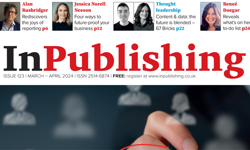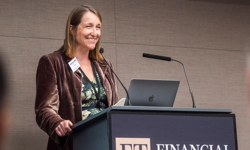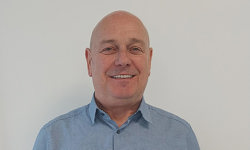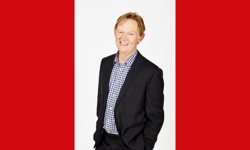‘Leftfield’ is the word media commentator Roy Greenslade used to describe the appointment of Barry McIlheney as chief executive of the Periodical Publishers Association when the news first broke earlier this year. ‘Evangelical’, however, is the descriptor that springs to mind as, four months into his new role, the one time editor of Smash Hits who went on to become editor of Empire, managing director of Emap Metro and chief executive of Emap Elan describes his early wins, current priorities, and the further changes that still lie ahead.
"Like most people, I hadn't spent my days in publishing wondering what was going on at the PPA and since arriving here I've tried not to focus too much on what went on before," he says diplomatically. "Because there was clear industry-wide desire for a fresh start, stronger leadership and greater consistency - a real appetite for change, I was determined it would be Year Zero from my first day."
McIlheney is referring, if somewhat obliquely, to the troubled and well-documented period prior to his appointment that followed the departure of long-standing PPA chief executive Ian Locks. Locks' successor, former barrister Jonathan Shephard who picked up the reins at the PPA in April 2008, oversaw a number of changes during his 15 month tenure including an organisational restructuring and the scrapping of the PPA's marketing research division. During this period, two affiliate organisations, the Association of Publishing Agencies and the Association of Online Publishers, began moves to dissolve their ties with the PPA.
Following a review of the PPA's operation by external consultants, concluded before McIlheney's arrival, moves progressed to rationalise the organisation's structure while paving the way for new management and the fresh approach the organisation's new chief executive would embody. Contrary to some observers' surprise at his appointment, McIlheney now insists the PPA role was "a perfect next step".
"I'd done 25 years in the trenches as a magazine journalist, editor, publisher, managing director etcetera as well as developed magazines in the UK, South Africa and US," he explains. "I'd done most of the things I wanted to do having left Emap shortly before the arrival of Bauer, tried (then failed) to write the great Irish novel, returned to writing articles and developed a number of ideas for different people. Then last year, after producing the Smash Hits Michael Jackson Special, I felt I'd come full circle. The PPA vacancy came up. An industry role was one of the few things I'd not done before."
The timing was perfect, he adds, coming as it did at a time when the magazine industry needs uniting more than ever. This need, he believes, underpins the PPA's mission and, as PPA chief executive, his vision for the organisation's future.
Focus on the members
"If I needed to do one thing from day one, it was get the focus back onto the members," he stresses. "By serving members, I mean helping them identify challenges, opportunities and threats to their businesses and working with them to help them achieve their goals." Key to this, however, was identifying which areas are best achieved with PPA involvement and which are not. "Should the PPA champion how best to develop front covers? I think that's best left to publishers' own design departments. Or how best to manage ad sales? Again, that's a sales departmental role. But, especially in the light of the new government, there's important background noise we must now engage with - in particular, the possibility moving forward that VAT could be raised on magazines."
Three priorities
McIlheney is quick to emphasise that he is still reviewing all aspects of what the PPA does. However, he identifies three priority areas for the organisation to engage with over the months ahead: lobbying - on VAT, obviously, but also tobacco and alcohol advertising; the environment - building further on what the PPA has already achieved; and the opportunities presented by digital - achieving a consistent, industry-agreed standard approach to measuring digital magazine content consumption is a specific goal.
"I'm absolutely committed to restoring a marketing-the-medium-to-advertisers-and-clients role for the PPA," he adds, warming to his theme. "We are already gearing up for the launch of a new marketing initiative. On July 15, we're staging an event for media planners and buyers to share our vision and talk about the value of magazines. We have also just appointed a head of research who will help move our marketing activities forward. It's not just about saying magazines are great, but promoting high quality editorial content with a magazine heritage delivered across any platform. It sounds a mouthful, but I'm talking about the unique mix of words and pictures and the relationship with the consumer that 'magazine' means, and that’s a mix that doesn't just have to be delivered via paper and ink."
The magazine industry has gone beyond the old debate about whether you are a magazine or a digital enthusiast, he adds, and as an organisation, the PPA must similarly raise its game.
Asked if the revival of its marketing remit could lead to the return of a Magazine Week-type initiative, McIlheney says it's too early to say - though if the executive team in consultation with PPA members think it's the best way to achieve their objectives then he'd be all for it. Asked about the potential future role of resurrecting some kind of Magazine News-style industry publication, however, he is more circumspect. "How we communicate what we're doing hasn't been as sharp as it could be and is already another focus," he explains. "We're now on Facebook, LinkedIn and Twitter and have recently upgraded our weekly members email newsletter. If we did a printed magazine it would have to be brilliant - there's no point unless it would stop people in their tracks. What I can say is it's not on the agenda at the moment."
What is on the agenda, however, is building on the PPA's strong track record in industry training, and also encouraging greater networking between different factions within the business. "The PPA is an incredibly broad church - from data businesses to B2B publishers and more print-reliant consumer titles," he says. "Moving forward, keeping this church together will be key, and a constant dynamic."
Networking services
Prior to McIlheney's arrival, the PPA already ran a monthly networking event for B2B members called First Wednesday. An early win, he explains, was the subsequent introduction of a more consumer publisher-focused monthly networking equivalent - Live at the PPA. Different types of business face different challenges and will, over time, evolve their particular ways of dealing with these, he believes, but key to the future success of all will be communication and collaboration between companies to achieve better understanding of what works, what doesn't, and best practice.
"The greatest help the PPA can provide is to say 'talk to this guy over here who did this, or that one over there who did that'. It's about shared experience, and there is a greater need than ever before for creating ways to enable this," he says. "Promoting collaboration is where I think we can help most."
PPA members will increasingly rely less on print - already the case for many B2B publishers, he readily concedes. But he doesn't see that will necessarily be the future for everyone. "One size does not fit all," he says. "Gradually over time other platforms grow, but there will always be fantastic products provided in print."
The digital dimension
Digital, of course, was the central theme of this year's PPA Annual Conference in late April which McIlheney does not hesitate to declare a great success. "The agenda was clear. The breadth of discussion warmed the cockles of my heart. I had the sense: we're back," he smiles. "It will be fascinating in a year’s time to see where some of these digital initiatives have got to. If the 2010 event was all about where now?, 2011's will be all about where have we got to?"
The months to come, McIlheney adds, will bring further challenges - for both the PPA in evolving its offering to members, and the magazine industry as a whole, but he remains confident about the likely outcomes of both.
Green shoots?
"The economic outlook for the industry today is more positive than some had expected. The last ABCs, for example, showed a 1.6% decline across the board, and a recent ad forecast suggested quite a positive picture for consumer magazines over the next five years," he says.
"I even saw some figures recently suggesting that 250 regular paid for consumer magazines were launched last year compared to 251 in 2008. Types of launches may change. The old FMCG-style multi million pound TV and print launch extravaganza for a print-only product is probably not now the way forward. But we will see more launches, and we will see print-led offerings across multiple platforms. Because the starting point, irrespective of platform, remains the same: a really clever idea that will turn people on by appealing to their passions. And while there will be a growing need for technical people within publishing, there will still be a strong need for people with journalistic skills, creative ideas, flair, spark and - of course - consumer understanding."
McIlheney adds that he will be watching closely uptake of the iPad which, he thinks, presents "a fantastic opportunity" for PPA members. "Looking ahead, say five years’ time, the digital landscape may well have evolved considerably but I don't think the PPA's role will be radically different from what it is and should be today. What I do hope, however, is that people will come to think that if you're not in the PPA then you're not serious about publishing. Achieving that, however, will depend on the PPA being totally focused on our members and continually building the right services - things I look forward to overseeing for the foreseeable future."










